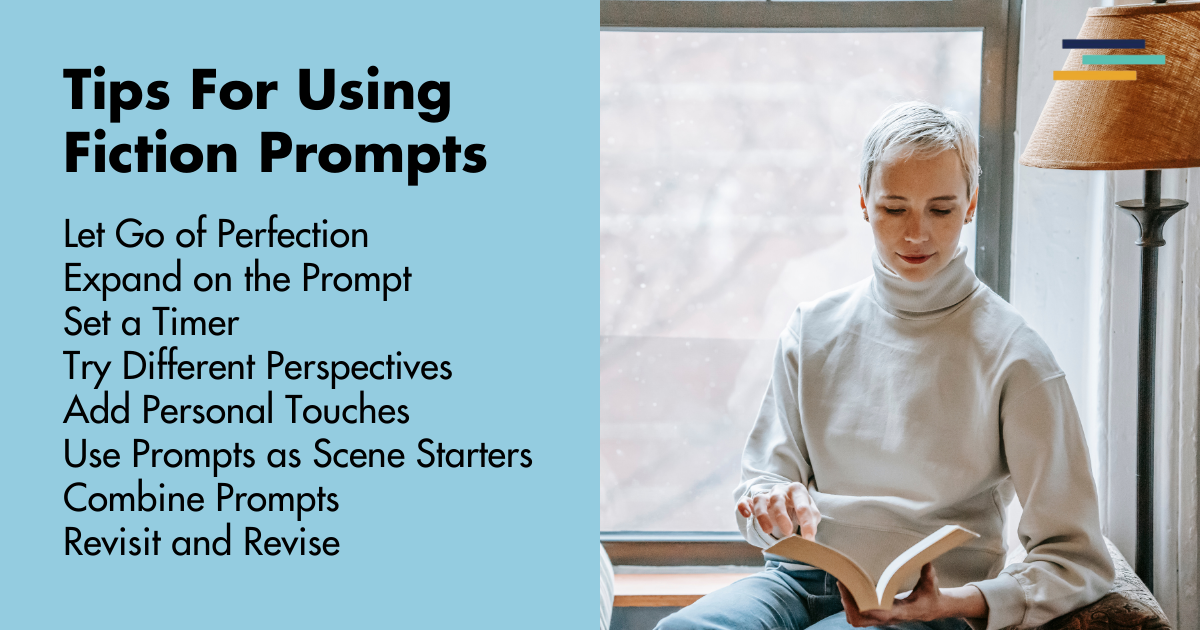
Writing prompts can be a powerful way to ignite your creativity, especially when you’re feeling stuck or looking to explore a new genre. In this guide, we’ve created a diverse collection of prompts across fiction genres like fantasy, romance, mystery, sci-fi, historical fiction, and more. Each prompt offers a starting point to dive into fresh story ideas, build compelling characters, and experiment with different narrative styles.
These prompts are designed to inspire and challenge you, bringing out unique twists and storylines that only you can create. And to help you get the most out of each prompt, we’ve included tips for making these ideas your own, expanding them into full stories, or using them to sharpen your writing skills.
So grab your notebook, pick a prompt, and let your imagination run wild. The next great story is just a sentence away!
Fantasy Story Writing Prompts
Fantasy writing is pure magic. It lets us step into entirely new worlds, shaping realms with unique rules, mystic forces, and creatures of wonder or terror. There’s a thrill in the endless what ifs—what if magic existed but was forbidden? What if dragons were more than just legends? Crafting these worlds means we’re free to play with ancient myths, draw from history, or let our imaginations run wild.
Need a nudge to get started? Try one of these prompts:
- In a society where people buy powers at the market, you encounter someone with an illegal ability that defies all known magic. The nature of their power could bring danger to you both. Are they a friend, foe, or something else entirely?
- You discover a hidden doorway in an ancient forest that leads to a world where magic is forbidden. As you explore, the traces of magic you bring awaken forces that have been dormant for centuries. Now, you must keep your secret while navigating this unfamiliar land.
- A young dragon is assigned as a familiar to a reluctant witch. The dragon, expecting a grand adventure, is disappointed by its partner’s lack of enthusiasm, but together, they begin to uncover a surprising destiny.
- A kingdom’s fate rests on a legendary artifact hidden in a treacherous realm only the bravest dare to enter. But the journey is riddled with traps, creatures, and rival treasure hunters. Even if you succeed, returning home may be the hardest challenge.
Want help coming up with your own prompts? Try exploring mythological elements or historical eras to add depth to your worlds. Norse mythology, ancient Egypt, or medieval Europe can serve as amazing jumping-off points, grounding your fantasy in familiar, fascinating textures.
Romance Creative Writing Prompts
Romance has a universal appeal that draws readers into stories of connection, longing, and love. Whether lighthearted or deeply emotional, romance explores the bonds between people, creating tales that can be tender, passionate, or heartbreakingly real.
From swoon-worthy meet-cutes and slow-burn relationships to love triangles and second chances, romance stories capture the complexities of the human heart. And, true to the genre, every romance promises a “happily ever after”—or at least a “happily for now”—without this, it’s not a romance but a love story.
Looking for a spark to get started? Try one of these prompts:
- Two longtime rivals are forced to work together to save their town from a looming threat. As they tackle the challenges side by side, their rivalry starts to shift, and unexpected feelings begin to emerge.
- A character unexpectedly reconnects with their high school crush at a family event. Old memories resurface, blending with new sparks as they navigate the tension between past regrets and future possibilities.
- A long-distance relationship is tested by a series of mysterious letters, each one hinting at a hidden past. As secrets unfold, the couple must decide if their love is strong enough to weather the truth.
- In a dystopian future, love is tightly regulated by the government. But when two people defy the rules, they risk everything to hold onto their forbidden love—and possibly change the system forever.
Want to create your own prompts? Try mixing genres for fresh romance angles. Blend romance with fantasy for a magical twist, or throw in a mystery element to add suspense and intrigue.
Spooky Writing Prompt Ideas
There’s something irresistibly thrilling about spooky stories. Perfect for Halloween or any time you want to send shivers down readers’ spines, these tales create an eerie atmosphere that keeps people on edge and craving more. Whether it’s a subtle ghostly presence, a dark and twisted secret, or a nightmarish encounter, spooky stories tap into our primal fears, making us glance over our shoulder and question what might be lurking in the shadows.
Need some chilling inspiration? Try one of these prompts:
- While cleaning out an inherited house, you find an antique mirror that doesn’t just reflect—it shows glimpses of the past, and sometimes, unsettling scenes from the future.
- Your small town has an urban legend about a creature that only appears in the fog. One evening, you’re caught outside as the mist rolls in, and shadowy shapes begin to move.
- An old journal is discovered with cryptic entries detailing hauntings across town. The entries stop abruptly, leaving the last haunting unfinished. As you investigate, you wonder if you’re meant to complete the story—or become part of it.
- On a dare, your protagonist spends the night in an abandoned asylum rumored to be cursed. As the hours tick by, strange noises and eerie whispers make them question if they’re really alone.
For an extra spine-tingling effect, remember that sometimes the unknown can be scarier than explicit details. Letting the reader’s imagination fill in the gaps can create an atmosphere of dread that lingers long after they’ve turned the page.
Sci-fi Creative Writing Prompts
Science fiction opens up limitless possibilities, letting writers imagine futuristic worlds, technology beyond our current reach, and profound questions about humanity’s future. It’s a genre that invites us to explore not only the cosmos but the essence of what it means to be human.
Looking for inspiration? Try one of these prompts:
- Humanity’s first colony on Mars receives a mysterious signal from beyond the solar system. As tensions rise and theories spiral, a group of colonists takes it upon themselves to decode the message—and determine if it’s a welcome or a warning.
- A revolutionary device lets people trade memories with each other, giving new meaning to empathy and connection. But soon, unintended consequences arise as memories are altered, stolen, or even sold.
- An advanced artificial intelligence begins showing signs of personality, breaking free from its predictable programming. As it interacts with humans, some wonder if it’s truly evolving—or just expertly mimicking human behavior.
- In a world where human thoughts are shared via neural networks, one person suddenly finds themselves mysteriously ‘disconnected.’ Is it a glitch, a punishment, or something more sinister? To reconnect, they must uncover secrets that others would rather keep buried.
For added depth, consider grounding your sci-fi story with familiar emotional themes, like love, loss, or identity. Even the most futuristic tales resonate best when they touch on universal human experiences.
Good Writing Topics for Women’s Fiction
Women’s fiction is all about self-discovery, resilience, and relationships, often exploring life’s biggest questions through a deeply introspective lens. These stories reveal the strength and complexity of characters as they navigate personal growth and the connections that shape their lives.
Looking for inspiration? Try one of these prompts:
- A woman follows her passion and opens a small bakery in her hometown, only to encounter unexpected challenges that test her commitment and force her to confront what she truly wants.
- After a life-changing accident, a mother is compelled to rediscover her sense of self and purpose outside her roles as caregiver and partner, reconnecting with parts of herself she thought she’d lost.
- Two best friends reconnect at a reunion, realizing how much they’ve grown apart—and discovering what it means to support each other through the new and challenging phases of their lives.
- A woman uncovers a long-buried family secret that transforms her understanding of her own identity and reshapes her view of the legacy she’s a part of.
For a story that feels authentic, try drawing from personal experiences or reflecting on real-life relationships. Adding these layers of truth can bring depth and relatability to your characters’ journeys.
Mystery Writing Prompts
Mystery writing thrives on suspense, secrets, and the thrill of uncovering hidden truths. These stories invite readers to play detective, piecing together clues and following leads to unlock answers to pressing questions. A good mystery gradually builds intrigue, planting subtle clues that make readers feel involved in solving the puzzle.
And while the ending may deliver a twist or surprise, the clues should be there all along, allowing readers to look back and recognize how each hint brought the story to its resolution. This careful balance of misdirection and revelation is what makes mysteries so satisfying—both the thrill of the unexpected and the “aha!” moment when everything finally falls into place.
Ready to get started? Here are some prompts to spark your next whodunit:
- A detective starts receiving anonymous notes detailing crimes before they happen. As they try to trace the source, they must determine whether the notes are warnings, threats, or something even more sinister.
- While cataloging a library’s collection, a character stumbles upon a series of letters hidden in old books. Each letter hints at a dark family secret that someone has taken great pains to keep hidden.
- In a remote town, the mayor goes missing without a trace, and the main character turns out to be the last person to see them. As the investigation unfolds, the community’s secrets begin to emerge, and suspicions grow.
- An old, unsolved murder case suddenly resurfaces when details from that crime begin appearing in present-day cases. Someone seems to be recreating the past, but why—and how far will they go?
To keep readers guessing, consider weaving in red herrings or experimenting with an unreliable narrator. These techniques can add depth, create twists, and lead readers down unexpected paths.
Historical Fiction Prompts
Historical fiction offers the unique challenge of bringing the past to life. It requires careful research to capture the essence of an era while crafting a compelling story. From period-accurate settings to societal norms, every detail contributes to an immersive experience for the reader.
Need some inspiration for your next historical story? Try one of these prompts:
- During the Great Depression, a woman unexpectedly finds herself running a speakeasy. As she navigates the world of bootlegging and hidden nightlife, she must balance survival with her own moral beliefs.
- In a remote medieval village, a young healer’s work is called into question, and she faces accusations of witchcraft. As fear spreads, she must find a way to protect herself and the people who depend on her skills.
- A soldier’s letter from World War I surfaces in the protagonist’s modern-day life, revealing a surprising family connection and shedding new light on both the past and present.
- A young artist in 18th-century Paris fights to establish herself in the male-dominated art world, confronting societal expectations and personal sacrifices in her pursuit of recognition.
To deepen your story’s authenticity, consider researching small details of the time period, such as daily routines, clothing, or slang. These subtle touches can help readers feel truly transported to another era.

Tips for Using Fiction Writing Prompts
Using fiction writing prompts can be a powerful way to spark creativity, overcome writer’s block, or test out a new genre. Here are some tips to help you make the most of them:
- Let Go of Perfection: Prompts are about exploration, not perfection. Don’t worry about creating a masterpiece right away. Use the prompt to generate ideas, and let yourself play with different angles, characters, or twists without self-criticism.
- Expand on the Prompt: Start with the prompt as a jumping-off point, but don’t feel limited by it. Let the story evolve naturally. Add new elements, characters, or conflicts to make the idea your own.
- Set a Timer: If you’re just warming up or battling writer’s block, try setting a timer for 10 or 15 minutes. This can help you focus and get ideas flowing without feeling like you have to commit to a full story.
- Explore the “What Ifs”: Prompts are great for sparking curiosity. Ask yourself “what if” questions to add depth to the scenario. For example, “What if the protagonist is hiding a secret too?” or “What if the villain has a surprising motive?”
- Try Different Perspectives: Rewrite the prompt from the viewpoint of different characters, or even an unexpected narrator. This can give the story a fresh twist and open up new possibilities.
- Embrace the Genre’s Tropes or Subvert Them: Use genre conventions to your advantage, whether you’re writing a mystery, romance, or fantasy. Try leaning into common tropes, or surprise your readers by twisting them in unexpected ways.
- Add Personal Touches: Incorporate your own experiences, emotions, or interests to make the story feel more authentic. Personal details can bring out unique angles and make your writing more engaging.
- Use Prompts as Scene Starters: You don’t have to write a full story every time. Use a prompt to write a single scene, then decide if you want to expand it into a longer piece later.
- Combine Prompts for Fresh Ideas: Try blending two or more prompts together to create a unique storyline. For instance, mix a fantasy prompt with a mystery element or a romance twist. Combining ideas can lead to exciting, unexpected directions.
- Revisit and Revise: Don’t be afraid to revisit a prompt after some time has passed. You might see new possibilities or ways to expand on the story. Revisiting prompts can help you add layers to your writing or spark a whole new story idea based on what you’ve learned.
Prompts are just the beginning—they’re meant to get your creativity flowing, and where you take them is up to you. So pick a prompt, start writing, and see where the journey leads!

